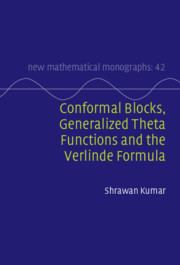2 results
5 - Moduli Stack of Quasi-parabolic G-Bundles and its Uniformization
-
- Book:
- Conformal Blocks, Generalized Theta Functions and the Verlinde Formula
- Published online:
- 19 November 2021
- Print publication:
- 25 November 2021, pp 163-183
-
- Chapter
- Export citation

Conformal Blocks, Generalized Theta Functions and the Verlinde Formula
-
- Published online:
- 19 November 2021
- Print publication:
- 25 November 2021

